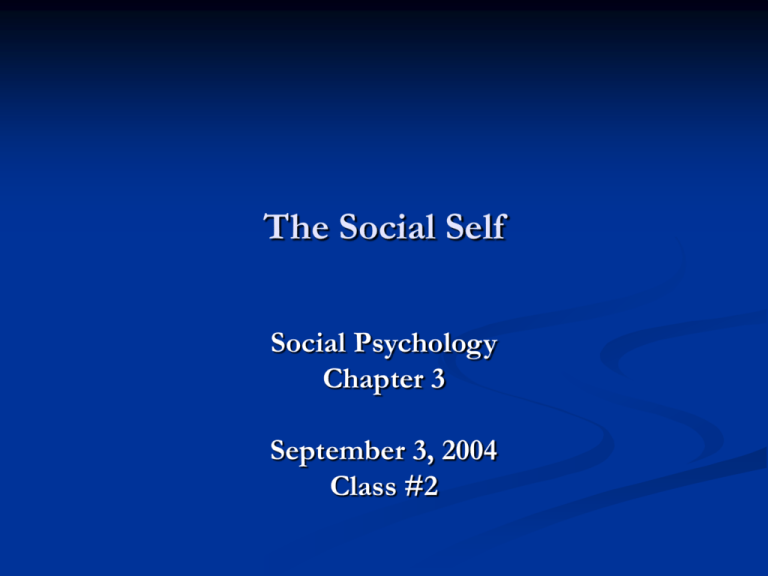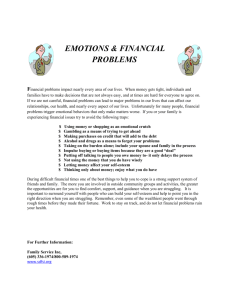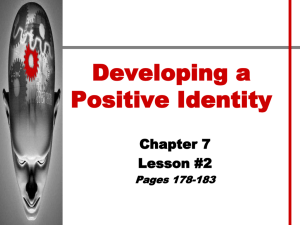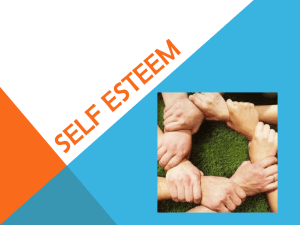Ethical Issues in Psychology
advertisement

The Social Self Social Psychology Chapter 3 September 3, 2004 Class #2 Self-Concept Self-Concept: Set of beliefs and perceptions about oneself Helps determine how individuals will behave Inconsistency between self-concept and experience evokes anxiety and threat Self-schemas Beliefs about oneself that help our processing of important self-relevant information Self-Perception Theory Bem (1972) We learn about ourselves by watching our own actions… Do we do this? If so, when? Social Comparison Theory Festinger (1954) When you are uncertain with your own abilities you evaluate yourself through comparisons with others You thought you were doing pretty good with you B+ average here at Three Rivers until your brother called from Harvard and happened to mention to your parents he has straight A’s this semester Do we look to others to determine our emotions? Schachter and Singer Two-Factor Theory DV: level of arousal IV1: injection of epinephrine vs. saline solution IV2: information IV3: euphoric or angry “confederates” Who am I? US: Individualism Japan: Collectivism Trafimow et al. (1997) Participants were from Hong Kong that used English as a second language… Half given the “Who am I” test in English and half given it inChinese Results: English: Personal traits Chinese: Group affiliation Interpretation of these results??? Self-Esteem How we feel about ourselves High self-esteem Low self-esteem Happier Fewer interpersonal problems Prone to psychological and physiological ailments Problems with social relationships and underachievement High self-esteem is fostered by experience of unconditional positive regard High Self-Esteem High self-esteem denotes thinking well of oneself Can be the result of three things: 1. Healthy self-confidence 2. Exaggerated sense of self 3. Conceited, egotistical, arrogant sense of self What is associated with high self-esteem? Don’t worry about failure, rejection, humiliation as much Have a clearer, more confident understanding of their identity (who am I?) Less likely to change opinions and attitudes in the face of persuasion Positive affect Positivity bias—rate others more positively Low Self-Esteem Negative, unflattering view of the self In practice very few people have “low” selfesteem Some people indicate that they “sometimes” feel low self-esteem What is associated with low self-esteem? Take a more pessimistic approach in order to protect the self… Worry more about failure, rejection, and humiliation Not the same as fear of success—they still want to succeed But will look for ways to avoid failures, rejections, and setbacks When our self-esteem is in jeopardy… Do we make downward social comparisons??? Let me see how my hard-luck friend is making out these days… He just lost his job and his girlfriend just dumped him He probably needs some cheering up Or maybe we bask in the glory of others? Yankees caps; Pats sweatshirts WHAT IS SELF-PRESENTATION? The process through which we try to control the impressions people form of us (also referred to as impression management) The Great Imposter In the fall of 1951, a lady glancing through her daily newspaper inadvertently unmasked one the most unusual deceptions in Canadian naval history… The story credited her son with performing this emergency operation on the deck of a Canadian destroyer off the coast of Korea One problem…her son had a general practice in a nearby town “Playing the part” Evidently, Fred Demara stole this guys identity and was able to successfully “play a part” Actually he played many different parts over a span of several decades Can we be whoever we want to be??? Dramaturgical Perspective The perspective that much of social interaction can be thought of as a play, with actors performances, settings, scripts, props, roles, and so forth Considering only your physical appearance, do you look: Socially dominant Kind and understanding Aggressive Intelligent Conscientious 1= not at all 9 = very much To what extent do you make a conscious effort to present yourself in terms of: clothing physical body way you carry yourself hair car 1= not at all 9 = very much To what extent do you make a conscious effort to present yourself in terms of: apartment/house/your room friends organizations/clubs other? 1= not at all 9 = very much WHY DO PEOPLE SELF-PRESENT? Why is it that often people don’t have that “here I am, take it or leave it” attitude??? WHEN DO PEOPLE SELF-PRESENT? We do all these things…but is it really a waste of time??? Social Spotlight Effect Researchers say we may overestimate the extent to which we’re in the public eye According to research from Cornell University psychologist Thomas Gilovich, most people greatly overestimate the amount of attention that others pay to their appearance, causing themselves needless angst So, don't beg off that party invitation because your hair dresser cut it too close, or because your clothes made the style pages in 1981 Wear your Manilow T-shirt -- no one's looking Gilovich, Medvec, & Savitsky (1996, 2000) The famous “un-cool T-shirt” experiments These researchers got students to wear a “Barry Manilow” t-shirt into their classes The Social Spotlight Effect esearch 50% 40% 30% 20% 10% 0% Predicted Actual Control The students who wore the t-shirt predicted that nearly half of the others would know who was on the shirt The Social Spotlight Effect esearch 50% 40% 30% 20% 10% 0% Predicted Actual Control In reality, less than a quarter of the other subjects recalled who was on the shirt Egocentric Bias We focus on our own behavior in a social situation, so we may think it is equally the focus of others This egocentric bias can lead to the “spotlight” effect - people believe that the social spotlight shines on them more brightly than it really does In reality, people just don’t notice us as much as we think they do Nevertheless, many of us have… Public self-consciousness The tendency to have a chronic awareness of oneself as being in the public eye Self Monitoring The tendency to be chronically concerned with one’s public image and to adjust one’s actions to fit the needs of the current situation In deciding how to behave in a given situation, do you: Examine your own attitudes, feelings, and opinions? Consider what other people expect of you and act accordingly? Are you good at acting? Self-monitoring High self-monitors: Inconsistent across situations Good at assessing what others want and tailoring their behavior to fit those demands Low self-monitors: Look inside themselves to decide how to act Don’t change as much across situations A word of caution… Self presentation is sometimes deceptive, but usually not… Because trust is necessary in social relationships, people go to great lengths to detect liars Goals of Self-presentation To be seen as likeable (ingratiation) To be seen as competent (self-promotion) To be seen as powerful (intimidation) Our obsession with attractiveness: Getting “the right look”… Why would someone want to undergo over 20 operations to try to obtain the “perfect” figure and face? What would drive a woman to spend a fortune to look like a “Barbie”? Cindy Jackson, the small town Ohio woman did just that… Cindy: Before… Cindy: After… A total transformation? 1979 1990 1994 2003 Cindy as a child… For Michael Jackson it didn’t quite work out as well… Lunch with Michael Jackson: What do you think they talked about? Making ourselves physically attractive… Research seems to indicate that attractive people receive many benefits, including: They are seen as more honest They are more likely to be hired for managerial positions and elected to public office They receive shorter sentences for felonies Realizing this, most people try to make themselves more attractive… In 1999, Americans had approximately 4.6 million plastic surgeries… Over 4 million Americans currently wear braces or other orthodontic devices People in the U.S. spend $33 billion a year on diet foods, weight loss programs, and health club memberships Appearing likeable We are generally interested in being liked by people with whom we want to start or maintain a friendship and by people who are in positions of power Appearing likeable Sex differences in likeability: Women more likely to: Smile Compliment others Agree with others Present themselves modestly Are women more agreeable? Research seems to support this contention… One explanation stresses socialization - women may get more social rewards for being agreeable Girls become more nonverbally agreeable as they move through adolescence and learn social expectations Another explanation stresses biology - women have lower levels of hormones that may incline men to be more disagreeable and confrontational Are women more agreeable? Testosterone: A hormone present in both males and females – but usually in much greater quantities in males – responsible for important aspects of sexual development People with higher levels are more confrontational and smile less Opinion Conformity as an Ingratiation Strategy How likely are you to change your opinions to agree with someone else? Would you be more likely to agree with someone who’s attractive? Zanna and Pack (1975) In this experiment, women anticipated interacting with a man who was either: Not Highly Desirable Highly Desirable Zanna and Pack (1975) And who held either: Traditional views of women believing the ideal woman to be a passive, emotional homebody Untraditional views of women believing the ideal woman to be independent and ambitious Zanna and Pack (1975) The women then filled out questionnaires for the male student to look at, including one reporting their own attitudes about gender roles Opinion Conformity: Amount of Attitude Conformity (Shift toward man’s views) 5.0 4.0 3.0 2.0 1.0 0.0 0.0 Undesirable Man Desirable Man Women about to interact with the undesirable man did not shift their opinions Opinion Conformity: Amount of Attitude Conformity (Shift toward man’s views) 5.0 3.7 4.0 3.0 2.0 1.0 0.0 0.0 Undesirable Man Desirable Man However, women about to interact with the desirable man adjusted their opinions to match his more closely Zanna and Pack (1975) • The researchers’ findings demonstrate that people sometimes change their public opinions to get desirable others to like them The Goal: To Appear Competent Self-promotion An attempt to get others to see us as competent Staging Performances Goal: To Appear Competent Staging Performances Because successes are sometimes overlooked we may seek opportunities to stage performances, or demonstrate our competence in public Conversely, people who are incompetent at something will avoid public stagings Staging Performances Goal: To Appear Competent Claiming Competence Claiming Competence These high self-promoting people rarely just tell others about their abilities… They exaggerate with elaborate stories Always have a “better story” Staging Performances Goal: To Appear Competent Claiming Competence Using the Trappings of Competence Using the Trappings of Confidence: Oh, the tricks of the trade… Good self-promoters often surround themselves with the props and habits of competence, such as: waiting to return our phone calls carrying cell-phones and pagers wearing clothes associated with competence Staging Performances Goal: To Appear Competent Claiming Competence Using the Trappings of Competence Making Excuses or Claiming Obstacles Making Excuses and Claiming Obstacles Some people go so far as to create real obstacles Self-Handicapping (see next slide) Making Excuses and Claiming Obstacles Self-handicapping The behavior of withdrawing effort or creating obstacles to one’s future effort Self-handicapping is utilized prior to situations where probability of success is uncertain or unlikely, whereas attributions are made after feedback has been given regarding performance Many researchers have found that people often engage in self-handicapping prior to an event that may threaten selfesteem, and provide a plausible excuse for failure rather than taking full responsibility upon themselves (Haemmerlie, Montgomery, & Zoellner, 1996) Haemmerlie et al. (1996) Identified are two types of selfhandicapping: Behavioral handicaps Self-reported handicaps Behavioral types These are the most obvious, and are overt actions that reduce the likelihood of success. Things such as inhibiting drugs and alcohol, reduced effort and practice, and distracting environment are examples of these obstacles Although they are sometimes perceived as more negative, they are the most convincing and effective due to the observable nature Examples of behavioral types… Taking condition-impairing drugs Not practicing Consuming alcohol Choosing unattainable goals Giving competitors a performance advantage Self-reported types These are claims that a condition exists that is impeding to performance that may or may not be true… These have a less costly effect to performance and include things like psychological and health problems, bad mood, and traumatic life events (Leary, et al., 1986) Behavior vs. Self-reported Studies have shown that when faced with a choice between the two, subjects will opt for the self-report because it provides an excuse for poor performance without actually lowering their chances for success, and that men more often provide behavioral barriers than do women, which is almost an extreme ratio of all to none (Deppe, et al., 1991)






